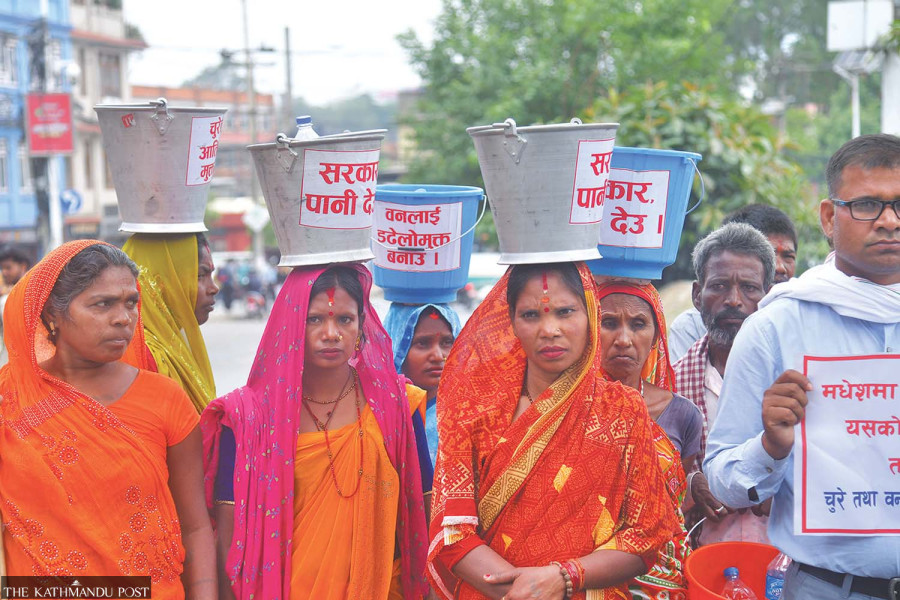National
Save Chure campaigners express dismay at government indifference to their demands
It’s been six days since the campaigners arrived in Kathmandu after their arduous walking journey, but the government has made no efforts to initiate talks.
Manushree Mahat
“Government, give us water”
“Save trees for water”
“Stop the encroachment of Chure”
These are the words lining the buckets of the protestors who marched all the way from Madhesh to Kathmandu campaigning for the preservation of Chure. A walk of 25 days, a significant region that has been suffering degradation for over 30 years, and yet the government has made no effort to talk with the protestors.
Sabita Kumari Mahato is outraged. She is the younger sister of the late Dilip Kumar Mahato, the environmental activist who was crushed and killed by a tipper truck for protesting the illegal mining of the Aurahi riverbed of Dhanusa. Despite the personal tragedy she and her family has suffered, Mahato attests that this is beyond her own personal matter now; this is the struggle of an entire region, she says, and soon the whole nation.
Chure has been the victim of rampant deforestation, exploitation of natural resources resulting in degradation and flooding, illegal extraction, and human encroachment. Locals have been suffering from problems such as shortage of water, landslides, soil erosion and degradation of crops.
“We can’t survive without water, nobody can,” Mahato says. “So why is the government barely doing anything about this?”
Sunil Yadav, central coordinator of the Chure and Forest Conservation Committee, says that it is shameful that locals have to depend on water tankers for their daily basic needs. “Tarai is lauded as the food basket of the country, but in the years to come, there will be nothing much to see because everything is slowly drying up,” Yadav says.
“You can see the effects of a warming climate everywhere—the Tarai, hills, and the mountains. Soon the degradation of Chure will affect the whole nation, because where will the grains come from?”
As the water level decreases, farmers have had to use water pumps. It has also led farmers to look for alternative sources of income, leading to the closure of many rice mills.
As the campaigners were protesting in Maitighar on Tuesday, the budget session was starting soon. Yadav and the campaigners were hopeful that Chure would receive an improvement on the budget allocated for it last year. However, the budget has only given continuity to the ongoing plan of afforestation and conservation of water resources.
In a country suffering adverse effects of climate change, the environmental conservation has been subpar.
On the surface, it may seem that the government has acknowledged the dire conditions of Chure, but the ground reality tells a different story.
In Andheri village of Mirchiya Municipality in Siraha, people have been suffering from an acute shortage of water. There, all natural sources of water, including the last remaining wells, have dried up. The locals now have to wait for tankers of water just to fulfill their basic needs.
In Karnali, villages have seen families moving away due to shortage of water as wells dry up. People who can move away do, but poor locals who can’t afford to leave have to continuously survive through mere buckets of water.
Despite the establishment of the President Chure-Terai Conservation Board, there has been little development in solving any of the many problems of the region. An assessment of the programme revealed that the conservation board has been ineffective due to a lack of an independent Chure conservation fund with full authority and a systemic policy.
“Right now, the poor people of the region are suffering the most. Soon, it will be the whole Nepal,” says Yadav.
The campaigners say they will not leave Kathmandu until their 12-point demands are met. The campaigners have asked for the creation of a Chure Conservation Act, the declaration of Tarai as a dry zone, the prohibition of mining of sand and stones in the riverbeds, the management of pollution of the Sirsiya river, and prohibition of construction in the name of development. They also demand an investigation into those forest workers who work in cahoots with smugglers in illegal extraction activities.
Between all of this, the campaigners are worried about their basic needs not being fulfilled. Water is vital for life, and campaigners like Sabita Kumari Mahato are bracing for worse to come.
It’s been six days since the campaigners arrived in Kathmandu from their arduous walking journey, but the government has made no efforts to initiate talks.
“At this rate, if the government remains idle, soon we’ll have to import water as well,” Mahato says.




 20.53°C Kathmandu
20.53°C Kathmandu















